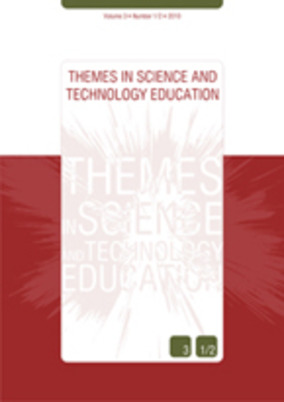Enhancing teaching and learning of home economics in secondary schools with wikis : An action research study
Part of : Themes in science and technology education ; Vol.5, No.1-2, 2012, pages 45-60
Issue:
Pages:
45-60
Section Title:
Articles
Author:
Abstract:
This article discusses an action research study using a wiki as a course platform for teaching and learning Home Economics in secondary schools. A secondary Home Economics teacher observed that dessert recipes were too wordy and that students generally felt bored and were not eager to read them in full. To improve his teaching effectiveness, the teacher attempts to investigate the use of a free wiki service (Google Sites) in order to supplement traditional classroom teaching and practice with online learning resources and activities. An action research approach is adopted in the study and the teacher tries to improve his teaching strategies to enhance interactions between the participants and improve students‟ learning outcomes. Furthermore, the teacher also attempts to integrate assessment activities with wiki-based learning activities to support students‟ learning in his class.
Subject:
Subject (LC):
Keywords:
Wiki, Web 2.0, Home Economics, peer assessment, self-assessment
References (1):
- Ansarimoghaddam, S., Tan, B. H., Yong, M. F., & Kasim, Z. M. (2012). Recent development of wiki applications in collaborative writing. Theory and Practice in Language Studies, 2(10), 2035–2044.Barlow, T. (2008). Web 2.0: Creating a classroom without walls. Teaching Science, 54(1), 46-48. Berry, R. (2008). Assessment for learning. Hong Kong: Hong Kong University Press.Biggs, J. (1996). Assessing learning quality: Reconciling institutional, staff, and educational demands. Assessment and Evaluation in Higher Education, 21, 5-15.Black, P., Harrison, C., Lee, C., Marshall, B., & Wiliam, D. (2003). Assessment for learning in the classroom: putting it into practice. Maidenhead: Open University Press.Boyd, D. (2007). The significance of social software. In T. N. Burge & J. Schmidt (eds.), BlogTalks reloaded: Social software research and cases (pp. 15-30). Norderstedt: Books on Demand.Buchanan, T. (2000). The efficacy of a World Wide Web mediated formative assessment. Journal of Computer Assisted Learning, 16, 193-200.Capobianco, B., & Lehman, J. (2006). Integrating technology to foster inquiry in an elementary science methods course: An action research study of one teacher educator's initiatives in a PT3 project. Journal of Computers in Mathematics and Science Teaching, 25(2), 123-146.Education Bureau (2007). Right technology at the right time for the right task. Retrieved 12 October 2012, from http://www.edb.gov.hk/FileManager/EN/Content_6177/emb_eng_e.pdf.Education Department (1994). Syllabus for Home Economics (Secondary 1-5). Hong Kong: The government printer. Heafner, T. L., & Friedman, A. M. (2008). Wikis and constructivism in secondary social studies: Fostering a deeper understanding. Computers in the Schools, 35(3-4), 288-302.Kemmis, S., & McTaggart, R. (eds.) (1988). The action research reader (3rd ed.). Victoria: Deakin University Press. Klamma, R., Chatti, M. A., Duval, E., Hummel, H., Hvannberg, E. H., Kravcik, M., Law, E., Naeve, A., & Scott, P. (2007). Social software for life-long learning. Educational Technology & Society, 10(3), 72−83.Kwok, R., & Ma, J. (1999). Use of a group support system for collaborative assessment. Computers & Education, 32, 109-125.Lai, Y. C., & Ng, E. M. W. (2011). Using wikis to develop student teachers‟ learning, teaching and assessment capabilities. The Internet and Higher Education, 14(1), 15-26.Macdonald, J., Weller, M., & Mason, R. (2002). Meeting the assessment demands of networked courses. International Journal on E-learning, 1(1), 9-18.McLoughlin, C., & Lee, M. J. W. (2007). Social software and participatory learning: Pedagogical choices with technology affordances in the Web 2.0 era. Proceedings of ASCILITE 2007. Singapore. Retrieved 12 October 2012, from http://www.ascilite.org.au/conferences/singapore07/procs/mcloughlin.pdf.McPherson, M., & Nunes, J. M. B. (2002). Supporting educational management through action research. International Journal of Educational Management, 16(6), 300-308.Mertler, C. A. (2012). Action research: Improving schools and empowering educators. Thousand Oaks, CA: SAGE. Morris, P. (1995). The Hong Kong school curriculum: Development, issues, and policies. Hong Kong: Hong Kong University Press.Ng, E. M. W., & Lai, Y. C. (2012). An exploratory study on using wiki to foster student teachers‟ learner-centered learning and self and peer assessment. Journal of Information Technology Education: Innovations in Practices, 11, 71-84.Nicholas, H., & Ng, W. (2009). Fostering online social construction of science knowledge with primary pre- service teachers working in virtual teams. Asia-Pacific Journal of Teacher Education, 37(4), 379-398.O'Reilly, T. (2005). What is Web 2.0: Design patterns and business models for the next generation of software Retrieved April 28 2008, from http://www.oreillynet.com/pub/a/oreilly/tim/news/2005/09/30/what-is- web-20.html.Oakley, P. (2012). 7 Best Google services for business collaboration and teams. Retrieved 12 October 2012, from http://philipoakley.org/2012/04/19/google-apps/7-best-google-services-for-business-collaboration-and-teams.Orsmond, P., Merry, S., & Reiling, K. (2000). The use of student derived marking criteria in peer and self-assessment. Assessment & Evaluation in Higher Education, 25(1), 23-38.Price, J. N. (2001). Action research, pedagogy and change: The transformative potential of action research in pre- service teacher education. Journal of Curriculum Studies, 33(1), 43-74.Stringer, E. T., Christensen, L. M., & Baldwin, S. C. (2010). Integrating teaching, learning, and action research: Enhancing instruction in the K-12 classroom. Thousand Oaks, CA: SAGE.Thomas, J. (2011). Build a teacher/student collaborative website with Google Sites. Retrieved 12 October 2012, from http://jeffthomastech.com/blog/?p=9304Wang, L. (2010). Implementing and promoting blended learning in higher education institutions: Comparing different approaches. In E. M. W. Ng (ed.), Comparative blended learning practices and environments (pp. 70-87). Hershey, PA: Information Science Reference.Wheeler, S., Yeomans, P., & Wheeler, D. (2008). The good, the bad and the wiki: Evaluating student-generated content for collaborative learning. British Journal of Educational Technology, 39(6), 987-995.




